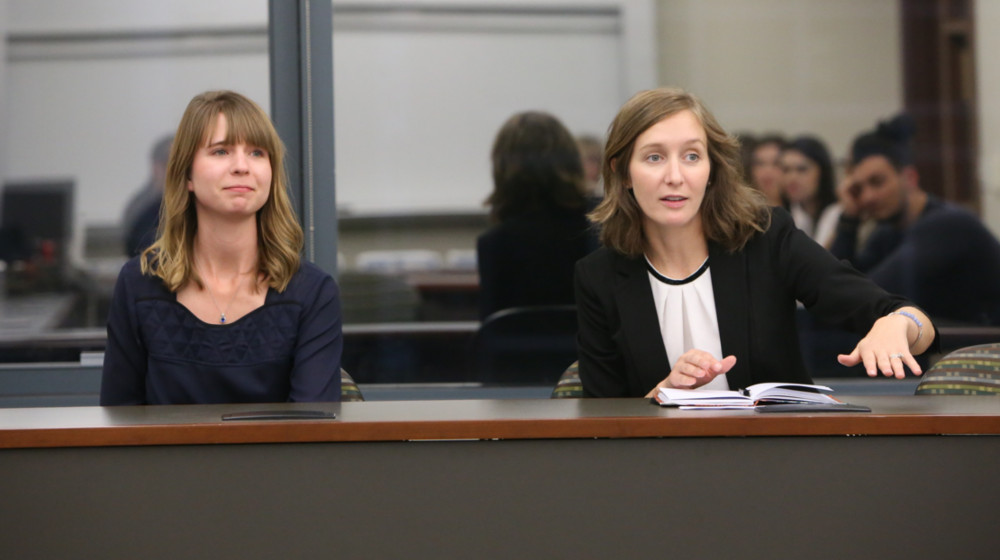Study locally, act globally
One of the things Alison Davis likes about working internationally is that it’s spontaneous—if you’re interested in getting experience abroad, you need to be flexible while trusting your instincts.
“Work just pops up,” says the third-year law student. “An organization might say, ‘We need somebody now, and you know the language and have the skills.’ A few weeks later, you’re doing the work.” The work Davis found herself performing this summer was consulting on an Ebola and Lassa fever prevention project in Benin. She’d traveled there to join her husband, who’s working in the West African country. Once on the ground, Davis put out feelers to local contacts and those she’d made earlier working for the Peace Corps and the United States government in Burkina Faso and Guinea. In short order, she had the job.
Davis and her colleagues focused on finding the best way to get border patrol agents, health care providers, and community leaders better prepared to quickly respond to health care emergencies in developing countries.
“It put into perspective the realities of global health security initiatives,” she explains. “People crossing the border who might have Ebola or Lassa fever could affect an entire country. It illustrates the urgency for countries to have an effective health care infrastructure because without it, entire villages can perish, and that can happen within months or even weeks.”
Protecting children’s rights
When her summer project ended, Davis wasn’t back at Loyola for very long before heading abroad again. In October, she traveled to Geneva with Katherine Kaufka Walts, the director of Loyola’s Center for the Human Rights of Children (CHRC), to present the center’s research on child labor trafficking to the United Nations Committee on the Rights of the Child.
After applying for a University graduate student scholarship with CHRC during her second year of law school, Davis landed a position under Kaufka Walts’s supervision researching the treatment of trafficking victims when they serve as victim-witnesses in criminal justice proceedings. The research served as the foundation for one of several recommendations to the UN committee, which is how Davis came to participate in the closed, confidential presentation. Her role included fielding questions from committee members. “We weren’t just representing children, but also organizations and experts in the field whose research we included in our report— people who’ve been dedicating their lives to the issues we were able to speak on,” says Davis. “There’s a lot of weight to that.”
Kaufka Walts believes Davis’s experience was unique because it allowed Davis to participate in an event that included the world’s experts on children’s rights. “It’s an exceptional opportunity to work on the critical, cutting-edge issue of child trafficking,” she says. “It was also invaluable in that it involved interdisciplinary research, exposure, and engagement with professionals across various disciplines, such as lawyers and social workers, and across sectors, such as nongovernmental organizations, public entities, and faith-based organizations,” adds Kaufka Walts.
“I think it gave Alison a really comprehensive perspective. When it comes to applied, real-world experience, it’s important for students to understand how their work impacts people in the field.”
Role in a war crimes trial
Another student benefiting from hands-on international experience during the summer months was Teresa Dettloff. The 3L worked as a legal intern for UN prosecutors at the International Criminal Tribunal for the Former Yugoslavia in the Netherlands. There, she found herself doing research for the final trial brief in the case of Ratko Mladic, a former Serbian general accused of war crimes.
Dettloff was able to observe court proceedings, but the bulk of her work involved digging up research to support the prosecutors’ arguments in the nearly 2,000-page brief. She also worked on a witness credibility project, evaluating whether accounts of witnesses for the defense from the military and prominent families could be trusted. “Being part of a trial that big, I left feeling like I’d done something really important,” states Dettloff, who’d like to make a career of doing international work and finds the contacts she made invaluable. “I met people from all over the world with all types of backgrounds, including people who are prosecutors in their home jurisdictions but for the last six years have been working for this tribunal. It opens so many doors.”
How did Dettloff land that great gig? She tracked the UN’s online job postings for months. In the meantime, she built her credentials by working with Professor James Thuo Gathii, Loyola’s Wing-Tat Lee Chair in International Law, for whom she’d served as a research assistant since her first year of law school. She also worked closely with Professor John Dehn to draft a paper on various aspects of international military law.
“That was probably an important factor—to develop a writing sample tied to the potential job,” she says. “Professor Gathii also wrote me a letter of recommendation and connected me with other Loyola students who’d worked in this field.”
Dettloff has advice for other students with dreams of making a difference globally: Go for it. “I didn’t think I had a shot at getting this job,” she says. “Apply for jobs you’re interested in. The worst that could happen is that you don’t get the job.”

